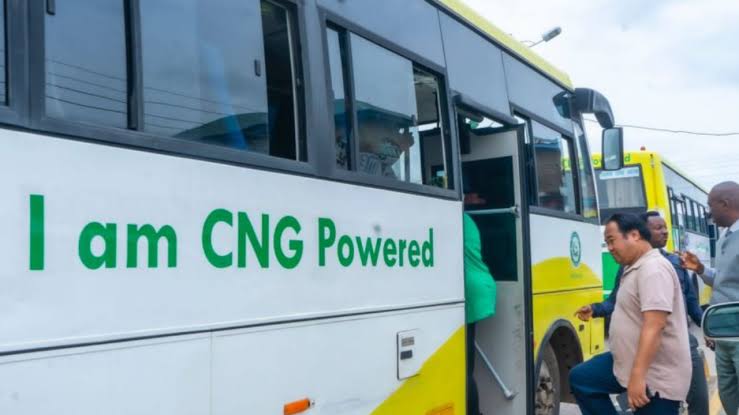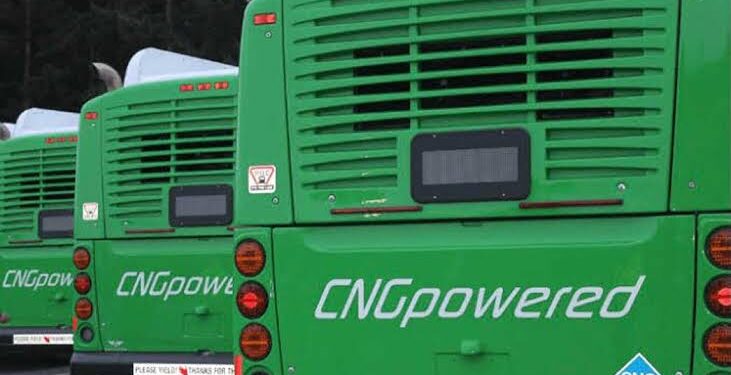The federal government has urged state governments to get involved in the nation’s energy transformation initiatives, putting special emphasis on the infrastructure development for compressed natural gas.
Michael Oluwagbemi, the Presidential Compressed Natural Gas Initiative’s programme director, made this plea on Saturday at a news conference in Abuja.Oluwagbemi underlined that states are essential to President Bola Tinubu’s energy transition agenda’s realisation.
He emphasised that state governments had to set an example by investing in CNG infrastructure since they stand to gain directly from better energy and transportation regulations.
“I cannot overstate the importance of states in Mr. President’s energy transition agenda.
Finally, states determine their own transportation policy, and the federal government can only push them to switch to energy-efficient vehicles and invest in infrastructure such as pipelines’, Oluwagbemi said.

He also noted that states control the majority of transportation laws, and that investment in energy transition projects will result in increased revenue distributions. “States are responsible for regulating transportation activity, and state governments benefit the most from increased income distribution. Because they are the primary beneficiaries, they should invest in it,” he stated.
Oluwagbemi advised states to encourage private citizens, especially civil personnel, to convert their petrol-powered vehicles to CNG and to invest directly in the product’s distribution.
“States should encourage private citizens, including civil servants, to convert their vehicles to CNG.” “They can also make direct investments in product distribution,” he said.
Oluwagbemi outlined the government’s deliberate efforts to strategically build CNG infrastructure along major transportation routes, ensuring that the energy transition benefits the vast majority of Nigerians.
He identified three important routes—Calabar to Benin, Lagos to Kano, and Lagos to Benin via Lokoja—as critical areas for CNG infrastructure deployment.
“We are ensuring that the investment is directed to the corridor with the most users.” Ninety percent of Nigerians use three key transit corridors: Calabar to Benin, Lagos to Kano, and Lagos-Benin-Lokoja,” Oluwagbemi stated.
He also stated that installing CNG refuelling stations along these corridors will drastically lower transportation costs and the overall cost of products, particularly food. “When we do that, there will be a reduction in the cost of food,” he informed me.
Oluwagbemi also addressed the expensive expense of installing CNG dispensing add-ons, which was a problem expressed by independent gasoline marketers and station operators.
He cited the Petroleum Industry Act, which grants the Nigerian Midstream and Downstream Petroleum Regulatory Authority access to the Downstream Gas Infrastructure Fund for members of the Independent Petroleum Marketers Association of Nigeria and the Major Oil Marketers Association of Nigeria.
Members of MEMAN and IPMAN may apply through the NMDPRA to obtain the funds required for what are known as add-ons. In order to guarantee that there is a simple template for add-ons, we are hopeful that the MDGIF will collaborate with us to look at this issue more proactively,” he said.
Oluwagbemi also reported that the NMDPRA conducted a research that found over 14,000 possible CNG add-on possibilities in Nigeria, indicating a major chance to expand CNG supply countrywide.
As part of the initiative, Oluwagbemi stated that the Federal Government has reached agreements with various transport unions, such as the National Association of Road Transport Owners, the Road Transport Employers Association of Nigeria, and the National Union of Road Transport Workers, to ensure cost-effective pricing for CNG-powered vehicles.
“In terms of cost-reflective pricing by the commercial vehicle owners who are beneficiaries, we already have agreements with NARTO, RETREAN, and NURTW to this effect,” he said, adding that CNG vehicles would be labelled to make them easily identifiable and to encourage passengers to demand reduced fares from operators using CNG.
Despite the push for CNG, Oluwagbemi acknowledged that some vehicles are still running on petrol, and full price reductions may not be immediate.
However, he expressed optimism that as more CNG vehicles come into use, market competition will drive down transportation costs. “As we use more CNG, the smart marketer will reduce prices to gain more customers,” he stated.
Bottom Line
CNG vehicles tend to be more fuel-efficient than gasoline or diesel vehicles, which can lead to reduced transportation costs for both individuals and businesses.
As more people adopt CNG vehicles, states can benefit from increased tax revenue and job creation associated with the development and maintenance of CNG infrastructure.
CNG emits significantly fewer pollutants than gasoline or diesel, contributing to improved air quality and public health.

















